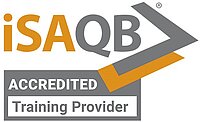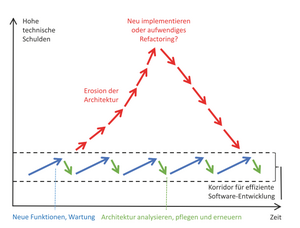
Seminars for Software Architecture, Modeling & Design
Good architecture ensures a relaxed sleep of the developers.
Software Architecture, as a fundamental element in the field of Software Quality Engineering, plays an essential role in ensuring the technical integrity and performance of software projects. Architecture defines the structural framework of software systems, including all components, their interactions, and interfaces to the external environment, and sets the technical guidelines for design and further development. A carefully designed software architecture specifically addresses technical quality criteria such as stability, latency, throughput, system security, testability and maintainability, and scalability. The use of proven patterns ensures efficiency.
When Software Architecture is directly integrated into Software Quality Engineering, it creates the conditions for developing systems that are not only robust and efficient but also flexible enough to adapt to future requirements. The methodical embedding in the quality engineering process ensures that software products meet not only current but also future user needs by highlighting technical excellence and sustainable system architecture.
Software architecture training is an investment that pays off in many ways - from increasing the efficiency and quality of your products, to improving scalability and performance, to fostering better collaboration and communication within your team. By improving the skills and knowledge of your developers in this crucial area, you can significantly increase the quality of your software products and ensure that your business remains competitive in the ever-evolving world of software development.
The impact of further training in software architecture on your product quality
Continuous training and professionalization in the field of software architecture can generate considerable value for your company, particularly in terms of product quality.
Increasing efficiency and quality through training
Software architecture is the backbone of any software system, and a solid architecture can help ensure that your product is on solid ground from the start. By improving the skills and knowledge of your developers in this area, you can significantly increase the efficiency and quality of your software products.
Effective training in software architecture can help developers better understand and apply best practices and design principles, leading to better structuring of code, improved maintainability and easier adaptation to future requirements. These aspects contribute directly to improving the overall quality of the product.
Increasing scalability and performance
A solid knowledge of software architecture enables developers to design and implement architectures that are scalable and perform well. This means that your product can easily scale as the number of users or amount of data increases while maintaining high performance. Further training in software architecture can therefore help to improve the scalability and performance of your product.
Promoting collaboration and communication
Software architecture serves as a common language for everyone involved in the project, including developers, project managers and stakeholders. Training in this area can improve communication and collaboration within your team as it gives everyone involved a common understanding of the project's goals and requirements. This can help to avoid misunderstandings and promote more effective collaboration, which ultimately improves product quality.
Benefits of good architecture
- Your software can also be maintained after many years.
- New functions can be easily implemented - almost like a reimplementation.
- The developers work on new features rather than on hard error analysis.
- The developers are satisfied and productive.
- You know if your architecture is capable of meeting future needs.
Quality starts in the head - with trainings from Software Quality Lab
We offer the following seminars and trainings on this topic in the Software Quality Academy:
- iSAQB® Certified Professional for Software Architecture - Foundation Level (CPSA-F) [DE]
- iSAQB® Certified Professional for Software Architecture - Foundation Level (CPSA-F) [EN]
- iSAQB® Certified Professional for Software Architecture - Advanced Level (CPSA-A): Domain-Driven-Design [DE]
- iSAQB® Certified Professional for Software Architecture - Advanced Level (CPSA-A): Improve [DE]
- iSAQB® Certified Professional for Software Architecture - Advanced Level (CPSA-A): Improve [EN]
- iSAQB® Certified Professional for Software Architecture - Advanced Level (CPSA-A): Soft Skills [DE]
- Cloud-native Software Development [DE]
- AI for Embedded Systems [EN]
- KI für Embedded Systeme [DE]
- EAM-Lehrgang Modul 1: Einführung Enterprise Architecture Management [DE]
- EAM-Lehrgang Modul 2: Application Architecture [DE]
- EAM-Lehrgang Modul 3: Data Architecture [DE]
- EAM-Lehrgang Modul 4: Business Architecture [DE]
- EAM-Lehrgang Modul 5: Technology, Integration & Platform Architecture [DE]
- EAM-Lehrgang Modul 6: EAM kontinuierlich weiterentwickeln [DE]

„If you think good architecture is expensive, try bad architecture“
Brian Foote and Joseph Yoder
Consulting
Our associated consulting company Software Quality Lab GmbH provides you with comprehensive project support.
A solid Software Architecture forms the backbone of any successful software system, ensuring stability, scalability, and long-term maintainability. It provides a structured framework for system components, guiding the development process while addressing both functional and quality requirements, such as testability, performance, and security.
Effective Software Architecture documentation and Software Architecture modelling help teams manage complexity and ensure software systems can evolve alongside business needs.
By defining clear design principles and component relationships, architecture reduces technical debt, simplifies code maintenance, and fosters greater team productivity.
Security is a crucial aspect of modern Software Architecture. Integrating security measures from the outset — known as secure by design — safeguards against cyber threats, protects sensitive data, and ensures compliance with regulatory requirements and industry standards. This proactive approach minimizes vulnerabilities and strengthens system resilience.
Key benefits of a well-designed and secure Software Architecture include:
Enhanced Product Quality
Clear structuring and well-defined interfaces improve code readability and maintainability.
Scalability and Performance
Proper design ensures systems can handle increasing data loads and user demands efficiently.
Security
Early integration of security measures reduces the risk of data breaches and unauthorized access.
Resource Optimization
A defined architecture provides a shared language for all stakeholders, aligning technical and business goals.
By investing in Architecture Trade-off Analysis Method (ATAM), workshops based on C4 software architecture, SYSML, UML and the targeted consideration of quality requirements in the software architecture, you can develop reliable, adaptable and future-proof systems – while reducing project risks and costs.
To Software Quality Lab Consulting



